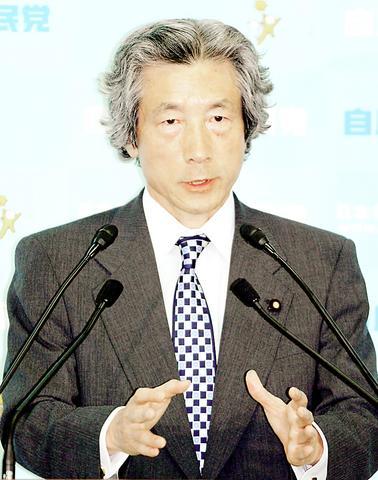Japanese Prime Minister Junichiro Koizumi vowed yesterday to push ahead with his reform agenda despite suffering a setback in elections seen as a verdict on unpopular policies on Iraq and pensions.
Koizumi's Liberal Democratic Party (LDP), which has ruled Japan almost uninterruptedly for nearly 50 years, won 49 of the 121 seats contested in Sunday's upper house election, a net loss of just one seat.
The main opposition Democratic Party of Japan (DPJ) won 50 seats, up from 38 before the election.

PHOTO: AFP
However, Koizumi's ruling coalition retained its majority in the upper house after its coalition partner, the New Komei party, won 11 seats. It also holds a majority in the more powerful lower chamber of parliament, which chooses the prime minister.
Newspaper editorials described the results as a slap down for an "arrogant" Koizumi by voters who were angry he had failed to explain the planned overhaul of the creaking pension system and the decision to keep troops in Iraq deployed since December.
But senior members of the ruling party, who have expressed frustration at Koizumi's high-handed management style, expressed support after last week suggesting a poor election result could see him deposed as premier.
Koizumi said he would not change course on key policy initiatives. He promised to keep up the structural reform of the economy and said Japan would maintain the contingent of troops doing reconstruction work in southern Iraq.
"I believe the public is calling for the ruling coalition to work with the opposition to push for our reform agenda," Koizumi told reporters, saying his reforms were responsible for the current economic recovery.
But analysts warned that he could be punished more severely next time unless he speeds up the reform process.
Koizumi could be forced to resign or dissolve the lower house in next summer and call a snap election, in which the Democrats could win power, said political analyst Minoru Morita.
"I think it will be difficult for him to last two more years," added Yoshiaki Kobayashi, political science professor at Keio University.
Koizumi acknowledged that a majority of Japanese opposed his decision to keep troops in Iraq as part of a multinational force, but he insisted it was the right thing to do.
"Japan needs to continue activities which will be regarded as valued work there," he said.

Conflict with Taiwan could leave China with “massive economic disruption, catastrophic military losses, significant social unrest, and devastating sanctions,” a US think tank said in a report released on Monday. The German Marshall Fund released a report titled If China Attacks Taiwan: The Consequences for China of “Minor Conflict” and “Major War” Scenarios. The report details the “massive” economic, military, social and international costs to China in the event of a minor conflict or major war with Taiwan, estimating that the Chinese People’s Liberation Army (PLA) could sustain losses of more than half of its active-duty ground forces, including 100,000 troops. Understanding Chinese

The Ministry of Foreign Affairs (MOFA) yesterday said it is closely monitoring developments in Venezuela, and would continue to cooperate with democratic allies and work together for regional and global security, stability, and prosperity. The remarks came after the US on Saturday launched a series of airstrikes in Venezuela and kidnapped Venezuelan President Nicolas Maduro, who was later flown to New York along with his wife. The pair face US charges related to drug trafficking and alleged cooperation with gangs designated as terrorist organizations. Maduro has denied the allegations. The ministry said that it is closely monitoring the political and economic situation

‘SLICING METHOD’: In the event of a blockade, the China Coast Guard would intercept Taiwanese ships while its navy would seek to deter foreign intervention China’s military drills around Taiwan this week signaled potential strategies to cut the nation off from energy supplies and foreign military assistance, a US think tank report said. The Chinese People’s Liberation Army (PLA) conducted what it called “Justice Mission 2025” exercises from Monday to Tuesday in five maritime zones and airspace around Taiwan, calling them a warning to “Taiwanese independence” forces. In a report released on Wednesday, the Institute for the Study of War said the exercises effectively simulated blocking shipping routes to major port cities, including Kaohsiung, Keelung and Hualien. Taiwan would be highly vulnerable under such a blockade, because it

UNRELENTING: China attempted cyberattacks on Taiwan’s critical infrastructure 2.63 million times per day last year, up from 1.23 million in 2023, the NSB said China’s cyberarmy has long engaged in cyberattacks against Taiwan’s critical infrastructure, employing diverse and evolving tactics, the National Security Bureau (NSB) said yesterday, adding that cyberattacks on critical energy infrastructure last year increased 10-fold compared with the previous year. The NSB yesterday released a report titled Analysis on China’s Cyber Threats to Taiwan’s Critical Infrastructure in 2025, outlining the number of cyberattacks, major tactics and hacker groups. Taiwan’s national intelligence community identified a large number of cybersecurity incidents last year, the bureau said in a statement. China’s cyberarmy last year launched an average of 2.63 million intrusion attempts per day targeting Taiwan’s critical